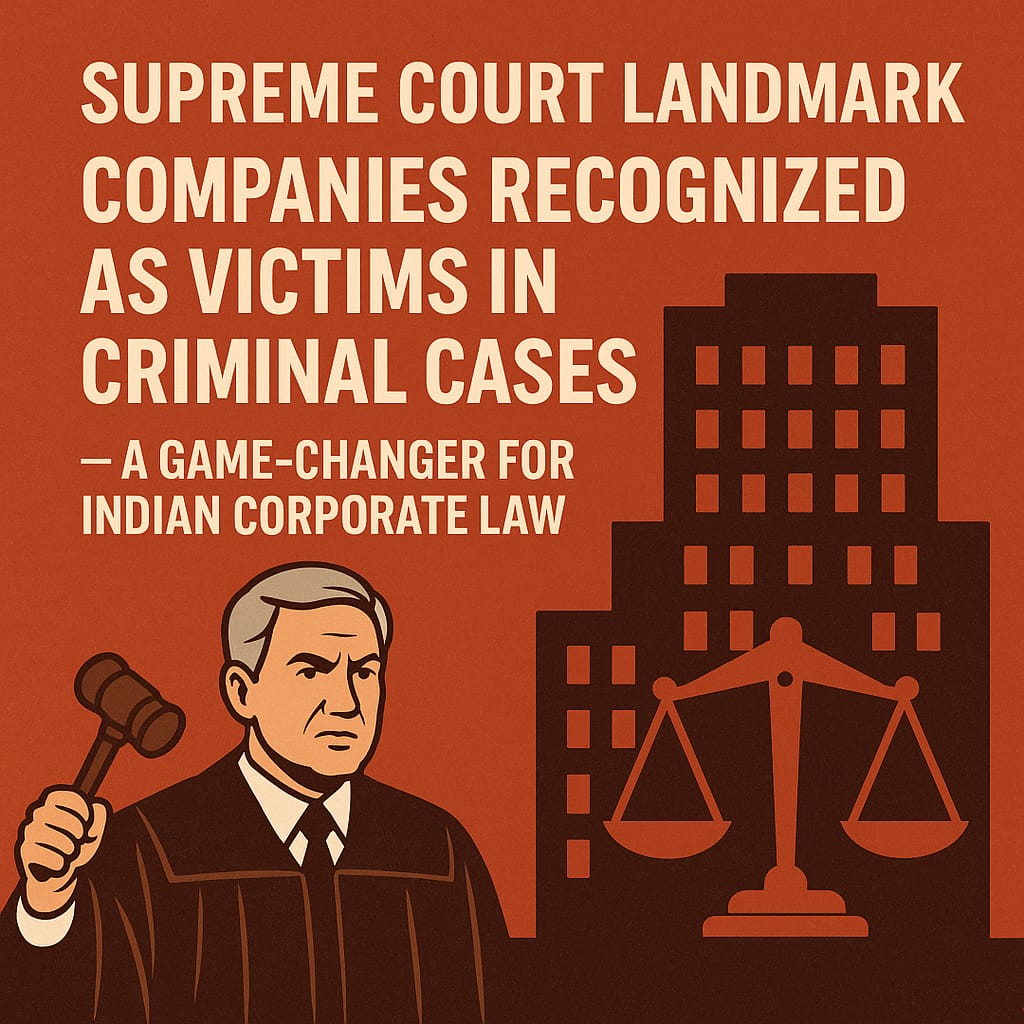Introduction
Paying attention to corporate justice, recently the Supreme Court of India has ruled that companies will also be treated as “victims” under criminal law. The impact of this historic decision will have a revolutionary effect on the businesses, mostly the corporate sector, in redressing the injustice done to them.This is an important question in Indian jurisprudence which confirms that legal protection and justice is not limited to individuals only but it will be provided appropriately in every sphere.
The Background of the Case
The cause that led to this landmark verdict concerns a corporate entity that has been denied the treatment and right to be a victim in the criminal system. Earlier there was clarity on how the law only helps individuals and how companies can actively participate in the criminal system.Now the Supreme Court of India has removed this difference and has stated in its decision that just as equal and natural persons have the right to get justice, similarly companies also have the right to get equal justice when injustice is done against them.
What the Supreme Court Held
The Supreme Court clarified that under Section 2(wa) of the Criminal Procedure Code (CrPC), the definition of a “victim” will include not only individuals but also entities like companies and firms. Many conditions are that injustice has been done to them. The court stressed that companies and firms are not entitled to prove their victimhood on the basis that they are not living beings. This creates an inequality before the law and the court.
Why This Matters for Indian Businesses
This decision will have a huge impact on the corporate landscape. Let’s find out why this is important?
Making companies legally strong – Now companies and firms can actively participate in the criminal system where they have been wronged such as:- fraud, misuse of pre-properties, cyber law, employees misconduct etc.
Stronger Deterrence Against White Collar Crime – This message and decision sends a message to similar individuals and entities that no criminal offence against companies and firms will be tolerated. This could lead to stronger internal compliance and ethics frameworks within organizations.
Compensation and Damages – Now recognized companies and victim companies can seek compensation and damages through legal means, paving the way for better financial recovery in cases of economic crimes.
Active Role in Prosecution – The aggrieved companies can now request the court to hear them during the trial. They should be allowed to submit proper evidence and they should be allowed to oppose the bail of the accused.
Legal and Business Community Welcomes the Decision
While legal experts and corporate leaders have lauded the decision as a long-overdue recognition of corporate rights in criminal justice.Some believe that corporate confidence in the legal sector will increase further, especially for startups and small businesses and multinational operations in India.
The decision is also expected to streamline criminal procedures by giving voice to corporate entities that often suffer silent losses due to bureaucratic delays or procedural technicalities.
Challenges Ahead
After the progress, some companies, especially MSMEs, lack awareness of their legal rights or resources to pursue criminal litigation. To ensure that the decision is implemented at the ground level there is a need for coordination between the police, courts and the corporate legal department.
Besides this, there may be an increase in corporate litigation and it may put more burden on the criminal system, so now the court will have to pay more attention to speedy justice and hearing of company victim cases.
To sum up
The Supreme Court’s decision to treat companies as victims is a progressive and pragmatic step. This brings Indian law in line with global law and reaffirms that justice is not just for individuals but should be accessible to all institutions and that justice must be equally accessible to every person in every sector. As India is emerging as a global economic superpower, this necessitates judicial clarity will be crucial in protecting the rights, assets, and integrity of its businesses.
About the Author
Sahil is a passionate law student currently pursuing BBA-LLB (3rd Year) from Maharishi Markandeshwar (Deemed to be University), Mullana, Ambala. With a keen interest in corporate and constitutional law, Sahil actively follows landmark judicial decisions shaping India’s legal landscape. He aims to blend legal knowledge with business insights to contribute meaningfully to the evolving legal ecosystem.

